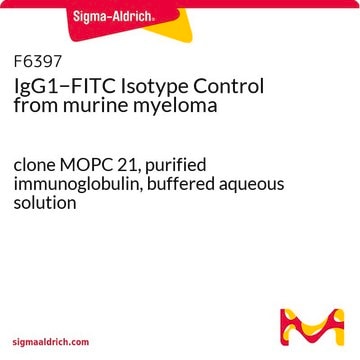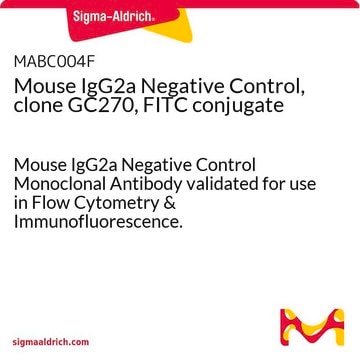F6522
IgG2a−FITC Isotype Control from murine myeloma
clone UPC-10, purified immunoglobulin, buffered aqueous solution
Synonym(s):
IgG2a−Fluorescein isothiocyanate
Sign Into View Organizational & Contract Pricing
All Photos(1)
About This Item
UNSPSC Code:
12352203
NACRES:
NA.46
Recommended Products
biological source
mouse
Quality Level
conjugate
FITC conjugate
antibody form
purified immunoglobulin
clone
UPC-10, monoclonal
form
buffered aqueous solution
storage condition
protect from light
technique(s)
flow cytometry: suitable
shipped in
wet ice
storage temp.
2-8°C
target post-translational modification
unmodified
General description
IgG2a (immunoglobulin G 2a) is one of the subclasses of rat immunoglobulins, which also include IgG1, IgG2b and IgG2c.
Specificity
Mouse IgG2a, κ, antibodies react with anti-mouse whole serum, anti-mouse IgG2a and anti-mouse κ chain immunoglobulins. The antibody preparation, IgG2a, does not react with antisera to mouse IgA, IgM, IgG1, IgG2b, IgG3 and λ light chain immunoglobulins in Ouchterlony double diffusion assays. IgG2a-FITC conjugate can be used as controls in immunoassays.
Application
IgG2a FITC Isotype Control from murine myeloma has been used in dual-colour staining and in cell staining for flow cytometry.
Biochem/physiol Actions
Immunoglobulin G (IgG) is a glycoprotein antibody that regulates immune responses such as phagocytosis and is also involved in the development of autoimmune diseases . Mouse IgGs have four distinct isotypes, namely, IgG1, IgG2a, IgG2b, and IgG3. IgG1 regulates complement fixation in mice.
Physical form
Solution in 0.01 M phosphate buffered saline, pH 7.4, containing 1% bovine serum albumin and 15 mM sodium azide.
Preparation Note
Prepared by conjugation to fluorescein isothiocyanate isomer I (FITC). This green dye is efficiently excited at 495 nm and emits at 525 nm.
Disclaimer
Unless otherwise stated in our catalog or other company documentation accompanying the product(s), our products are intended for research use only and are not to be used for any other purpose, which includes but is not limited to, unauthorized commercial uses, in vitro diagnostic uses, ex vivo or in vivo therapeutic uses or any type of consumption or application to humans or animals.
Storage Class Code
10 - Combustible liquids
WGK
nwg
Flash Point(F)
Not applicable
Flash Point(C)
Not applicable
Personal Protective Equipment
dust mask type N95 (US), Eyeshields, Gloves
Certificates of Analysis (COA)
Search for Certificates of Analysis (COA) by entering the products Lot/Batch Number. Lot and Batch Numbers can be found on a product’s label following the words ‘Lot’ or ‘Batch’.
Already Own This Product?
Find documentation for the products that you have recently purchased in the Document Library.
J Schultz et al.
Cancer research, 60(23), 6663-6669 (2000-12-16)
Single-chain Fv antibody fragments from the CD20-specific murine monoclonal antibody B9E9 were genetically engineered as streptavidin fusions [single-chain Fv-streptavidin (scFvSA) fusion protein] for use in pretargeted radioimmunotherapy. The scFvSA constructs were expressed as soluble, tetrameric species in the periplasm of
Toll-like receptor mRNA expression patterns in human dendritic cells and monocytes
Kokkinopoulos I, et al.
Molecular Immunology, 42(8), 957-968 (2005)
Expression of the Multiple Sclerosis-Associated MHC Class II Allele HLA-DRB1 * 1501 Is Regulated by Vitamin D
Ramagopalan SV, et al.
PLoS Genetics, 5(2), e1000369-e1000369 (2009)
T Nakamura et al.
Proceedings of the National Academy of Sciences of the United States of America, 95(9), 5389-5394 (1998-06-06)
Activation of hepatic stellate (Ito) cells is a final common pathway of liver fibrosis. The findings presented in this paper indicate that expression of Na+/Ca2+ exchanger (NCX) emerges in rat hepatic stellate cells after activation in vitro during primary culture
Three classes and four (sub) classes of rat immunoglobulins: IgM, IgA, IgE and IgG1, IgG2a, IgG2b, IgG2c
Bazin H, et al.
European Journal of Immunology, 4, 44-48 (1974)
Our team of scientists has experience in all areas of research including Life Science, Material Science, Chemical Synthesis, Chromatography, Analytical and many others.
Contact Technical Service







